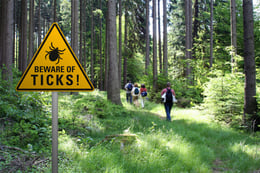Ticks may be small, but their bite can pack a big punch; in fact, Powassan virus, one of the many diseases ticks can spread to humans, was recently confirmed in Sharon, MA. Living in a hotbed for tick activity, it’s important for Massachusetts residents to know about the health risks posed by these nasty nuisances.
 Common tick-borne diseases include Lyme disease, babesiosis, and anaplasmosis; less common but still seen in our area are Powassan virus, Rocky Mountain spotted fever, and tularemia.
Common tick-borne diseases include Lyme disease, babesiosis, and anaplasmosis; less common but still seen in our area are Powassan virus, Rocky Mountain spotted fever, and tularemia.
Lyme Disease is a bacterial infection spread to humans through the bite of an infected tick, commonly the deer tick. Symptoms include rash, fever, headache, fatigue, and muscle or joint aches. If untreated, the infection can spread to joints, the heart, or the nervous system. Early intervention with antibiotics provides the best chance at recovery.
Babesiosis is an infection of the red blood cells, caused by parasites called Babesia. Common symptoms are fever, chills, body aches, headache, fatigue, and loss of appetite. Treatment typically involves antibiotics and antiparasitic drugs.
Anaplasmosis is a disease caused by bacteria transferred via tick bite. Symptoms include fever, chills, headache, muscle aches, nausea, vomiting, and loss of appetite. Similar to Lyme disease, the sooner antibiotic treatment begins, the better.
Powassan virus is less common, but should be mentioned here in light of recent news and the fact that, according to the CDC, cases have been increasing overall in recent years. Many people infected with Powassan virus show no symptoms; those with symptoms may experience fever, headache, vomiting, and weakness. Powassan virus can also cause severe illness, including encephalitis and meningitis. There are no vaccines to prevent or medicines to treat Powassan virus disease.
 Bite prevention is key
Bite prevention is key
Because there are no vaccines for tick-borne illnesses, your best defense is tick bite prevention.
- Use EPA-approved repellents
- Wear light colored clothing to make ticks easier to spot
- Wear long sleeves, pants, and tall socks
- Avoid brush and tall grass; stick to the center of trails when hiking
- Perform thorough body checks on people and pets after spending time outdoors
If you find you have been bitten despite your best efforts, safely removing the tick as soon as possible can help to reduce your risk:
- Gently pull hair away from the bite site
- Using pointy tweezers, grasp the tick as close to the head as possible
- Pull the tick straight out until the head is removed - do not twist or wiggle
- Dispose of the tick in the toilet or closed trash bin, wrapped in tissue
- Wash the area with soap and water or rubbing alcohol
- Monitor yourself for symptoms and contact your doctor if you suspect you have contracted a tick-borne illness
With the correct precautions, you can significantly reduce your risk of falling prey to ticks. For added protection in your yard, call a professional tick control company like Burgess Pest - our team is here to put a stop to whatever is bugging you, all year long.


